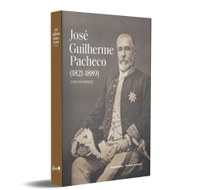Book launch: José Guilherme Pacheco (1821-1889), o Rei de Paredes
Over the course of thirteen chapters, this research work covers the life and work of José Guilherme Pacheco, who distinguished himself by his brilliant professional, civic and political career, from the 1850s onwards.
A notable jurist and man of causes, very close to prominent political figures such as Fontes Pereira de Melo and Martens Ferrão, loyal to the Regenerador (Regeneration) Party until the end of his life, he was mayor of Paredes on several occasions, a municipality whose progress he fought for with such commitment and success, garnering such local unanimity, that he earned the epithet ‘king of Paredes’ during his lifetime. In the Portuguese Parliament, where he sat for several terms, he excelled as an eloquent orator and prolific legislator. He was a prosecutor and then president of the Junta Geral do Distrito do Porto (Porto District political body) for almost a decade, as well as civil governor of Angra do Heroísmo, Azores.
The ultimate example of modern caciquism, in which influence within the state machine took precedence over capital, he gathered fervent supporters and opponents, clashing with Oliveira Martins, being the target of an alleged assassination attempt and, decades later, imprisoned in the jails of the Civil Government of Porto. A humanist and benefactor, and a member of numerous civic institutions, he was one of the main driving forces behind Jornal de Notícias, one of the main and oldest Portuguese newspapers, still in circulation.
He was undoubtedly one of the great politicians of Portuguese Liberalism in the second half of the 19th century, whose life journey, until now still largely unknown, is finally revealed, at least in its fundamental part, throughout the more than 500 pages of this work, sponsored and published by the Municipality of Paredes.

